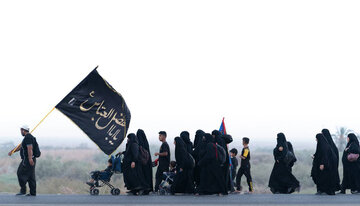(Ahlul Bayt News Agency) - It is also narrated from Imām as-Sādiq (as): “Whether in this world or in the hereafter, one has not, and will not, perceived a pleasure more pleasurable than sexual relations with women, and certainly this is the commentary of the words of Allāh (swt) in the Qur’an, in Surat Āli-‘Imrān, verse 14 where He states: “To mankind has been made to seem decorous the love of (worldly) desires, including women and children.” He then said: “Indeed, the people of heaven do not take delight in the pleasures of heaven more than Nikah[29]; neither food nor drink has that much pleasure for them.”[30]
As with every other aspect of our lives, Islam provides us with all the necessary information for the sexual lives of man and woman. The reason for this is simple; Islam recognizes the innate nature of man, and has ordained sexual relations for pleasure, and not just procreation. Sexual desires cannot, and should not be repressed, but rather regulated for one’s well being in this world and the hereafter. If these rules are paid attention to and carried out with the intention of the pleasure and closeness of Allāh (swt) and staying away from the evil of Satan, it is counted among the greatest of virtues.
Importance of Sexual Relations
There are many traditions relaying the importance of sexual relations. It has the station of worship and Sadaqah, and has been called the sunnah of the Prophet (s).
Imām as-Sādiq (as) narrates that the Prophet (s) addressed one of his companions on the day of Friday and asked: “Are you fasting today?” (The companion) replied, “No.” The Prophet (s) asked: “Have you given anything as Sadaqah today?” (The companion) replied, “No.” The Prophet (s) told him: “Go to your wife and that is your very Sadaqah to her.”[31]
In another tradition, Imām as-Sādiq (as) narrates that the Prophet (s) said to someone: “Are you fasting today?” He said, “No.” The Prophet (s) asked: “Have you gone to visit a sick person?” He replied, “No.” The Prophet (s) asked: “Have you been to escort a deceased person?” He replied, “No.” The Prophet (s) asked: “Have you given food to a poor person?” Again he gave a negative response. The Prophet (s) told him: “Go to your wife and going to your wife is Sadaqah (Go to you to her so that you get all the reward for all these acts).”[32]
Muhammad bin Khalad narrates from Imām al-Ridā (as): “Three things are from the sunnah of the noble Prophets and the messengers of Allāh, and these are application of perfume, cutting of the hair and engaging in a lot of conjugal relations.”[33]
Staying away from sexual relations with one’s wife is a result of Satan’s whisperings, and has many negative consequences such as arguments and rancour between husband and wife.
It is narrated from Imām as-Sādiq (as): Three ladies went to the Prophet (s) to complain. One of them said: “My husband does not eat meat.” The other said: “My husband does not smell perfume and does not use perfume,” and the third lady said: “My husband does not come near the ladies (i.e. does not engage in sexual relations).” The Prophet (s) with unhappiness, in the manner that his blessed Aba (cloak) was dragging on the floor, left and went to the mosque and on to the minbar. He praised Allāh (swt) and then said: “What has happened, that a group from my followers don’t eat meat, or don’t apply perfume, or don’t go to their wives? Whilst I eat meat, I apply perfume and also go to my wife. This is my sunnah, and any person that turns away from this sunnah is not from me.”[34]
Imām as-Sādiq (as) has also narrated: The wife of ‘Uthmān bin Ma’dhūn came to the Prophet (s) and said: “Oh messenger of Allāh (swt), every day ‘Uthmān fasts and in the evenings engages in Salāt.” The Prophet (s) picked his sandals and angrily went to ‘Uthmān (such that he did not wait to put his sandals on) and saw him in the state of Salāt. Because ‘Uthmān saw the Prophet (s) he abandoned his prayer. The Prophet (s) addressed him and said: “Allāh (swt) has not sent me to be a recluse, I swear by Allāh (swt) that has instigated me to this pure, orthodox and easy religion, I fast, I pray and I go to my wife, and any one that likes my custom, must be bound by my sunnah and custom, and Nikah[35] is from my sunnah.”[36] Importance of Satisfying your Wife
Satisfying one’s wife is an important issue in Islam, as demonstrated by the traditions below; indeed, lack of satisfaction over a long period of time can lead to frigidity and dislike towards the husband.
It is narrated from Imām ‘Alī (as): “When any of you wants to sleep with his wife, he must not rush her for indeed women have needs (too).”[37]
It is important for the husband to be aware that a woman’s sexual desire takes longer to express itself, but once it is elicited, is very strong, whereas a man is quickly aroused and also can quickly be satisfied.
Lastly, it is interesting to note that the importance placed by Islam on the satisfaction of both man and woman, is a clear indicator of the justice and fairness of Allāh (swt). Indeed, it is repeatedly stated in the Noble Qur’an that man and woman were created from a single soul[38], and this is just one example of this.
Recommended Acts
There are no specific rules for sexual intercourse; whatever is mutually pleasing is right, and likewise, whatever is mutually displeasing should be avoided; the only exception to this rule is what the Sharī’ah clearly forbids. However, there are several recommended acts that, if followed, will inevitably lead to a more pleasurable experience.
Before Intercourse
1. Brush your teeth and chew pleasant-smelling things in order to remove any smells in the mouth. Likewise, try not to eat unpleasant smelling foods prior to intercourse either, such as onions and garlic.
2. Ensure you smell pleasant – the freshest smell is the one after a shower or a quick wash, and the worst smell is that of sweat! Women in particular are sensitive to smell.
Use of perfumes, oils and the like are recommended, although it is important to note that it is better to use natural substances that have been recommended in Islam as they lack chemical ingredients that may cause damage to the body.
In particular, kohl has been recommended for women. It is narrated from Imām al-Bāqir (as): “To put collyrium (kohl) round the eyes gives the mouth a good smell, and makes the eye lashes strong and increases the power of sexual intercourse.”[39]
It is also narrated from Imām as-Sādiq (as): “To put collyrium (kohl) in the evenings is beneficial to the eyes and during the day it is Sunnah.”[40]
NOTE: Although the traditions recommend the usage of kohl, they do not condone its usage in places where it can be seen by men and can be a source of attraction.
Foreplay
Importance of Foreplay
As highlighted earlier, satisfying one’s wife is very important and engaging in sexual intercourse quickly and hastily is not the correct way. There is an average difference of eight minutes between the time a man and a woman reach climax; a man usually takes two minutes to reach climax and a woman takes ten minutes to reach climax. Therefore, in order to fully satisfy his wife, a man should caress her and engage in foreplay so that both partners reach climax at the same time.
Islam greatly stresses the importance of foreplay, as indicated by the traditions below.
It is narrated from the Prophet (s): “Do not engage in sexual intercourse with your wife like hens; rather, firstly engage in foreplay with your wife and flirt with her and then make love to her.”[41]
It is also narrated from the Prophet (s): “All play and games are futile except for three: Horse riding, archery and foreplay with your wife, and these three are correct.”[42]
It is narrated from Imām ‘Alī (as): “Whoever wants to get close to his wife must not be hasty, because women before engaging in the act of love making must be engaged in foreplay so that they are ready for making love to.”[43]
It is narrated from Imām as-Sādiq (as): “The Angels of Allāh and those who are witnesses over all the actions of man are watching them in every state except at the time of horse riding competitions and the time that a man engages in foreplay with his wife before engaging in sexual intercourse.”[44]
Method of Foreplay
There are very few restrictions to the methods used in foreplay; kissing, cuddling, etc. are all allowed. Below are some tradition pertaining to specific methods:
a. Caressing the breasts
It is narrated from Imām al-Ridā (as): “Do not engage in sexual intercourse unless you engage in foreplay, and play with her a lot and caress her breasts, and if you do this she will be overcome by passion (and excited to the full pitch) and her water will collect. This is so that the emission of the watery juices shoots off from the breasts and passion becomes evident from her face and her eyes and that she desires you in the same way you desire her.”[45]
b. Oral sex
Imām al-Kādhim (as) was asked: “Is there a problem if a person kisses the private part of his wife?” The Imām responded: “There is no problem.” [46]
NOTE: Though masturbation (i.e., self-stimulation of one’s own sexual organ until emission of semen or orgasm) is not allowed, in the case of married persons there is no problem if the wife stimulates her husband’s penis until the emission of semen, or the husband stimulates his wife’s vagina until orgasm. This is allowed because it does not come under “self-stimulation”; it is stimulation by a lawful partner.
c. Other
It was asked of Imām as-Sādiq (as): “If someone undresses his wife (and makes her naked) and looks at her, is there a problem?” He replied: “There is no problem, is there any better pleasure than this that exists?” Again a question was asked: “Is there any problem if a husband plays with the private part of his wife?” The Imām replied: “There is no problem, provided that he doesn’t use anything other than his own body parts (i.e. nothing external).” Again it was asked: “Is there a problem performing sexual intercourse in water?” Imām replied: “There is no problem.”[47]
NOTE: The above tradition highlights the restriction of use of foreign objects
After Intercourse
1. It is mustahab that Ghusl al-Janābat should be performed soon after sexual intercourse, and the sooner it is performed the better. Also, if one would like to have sexual intercourse more than once in one night, it is better that after every time, they perform Ghusl. However, if this is not feasible, it is recommended that one should do Wudū before every act.[48]
2. Immediately after completing the act of intercourse, the husband should perform the Ghusl and at that very moment consume a portion of bee wax (reputed to heal all sorts of wounds especially fractures) mixed with honey and water or mixed with pure honey, as this will replace and compensate for the lost fluids.[49]
3. If a man’s virility strength quickly ceases after intercourse, he should keep himself warm and sleep.[50]
4. The husband and wife should both use separate towels to clean themselves. It is narrated from the Prophet (s) that if only one towel is used, this leads to enmity and separation between the two.[51]
Acts not Recommended Makrūh [Discouraged] acts
1. Anal intercourse[52]
Anal intercourse is permissible with the consent of the wife; however, it is a strongly disliked act.
Zaid ibne Shabith narrates that a person asked Imām ‘Alī (as): “Can you get close to a woman from her behind?” Imām ‘Alī (as) replied: “Be down with you! Allāh lowers you by this means (of entering a lady). Have you not heard the words of your Lord that is narrated from Lut who said to his community: “What! Do you commit an outrage none in the world ever committed before you?’”[53] and [54]
There are some who justify this act with the following verse of the Qur’an:
“Your women are a tillage for you, so come to your tillage whenever you like.”[55]
However, Imām as-Sādiq (as), in his tafsir of the above verse of the Noble Qur’an narrates that: “The intention of this verse is that sexual intercourse should be performed from the front, for the reason that the wife in this verse has been compared to tillage (a cultivated land) that gives produce (from the top of the land), which is (just like) the front of the wife because this is from where (children) come into existence and into this world.”[56]
Abū Basīr narrates that he asked Imām (as) what the ruling is of someone who gets close to his wife from the back. The Imām considered this act unacceptable and said: “Stay away from the back of the wife and the meaning of the Noble verse of Surat al-Baqarah (above) is not that you can enter the wife from wherever you want, but rather (it is that you should) perform sexual intercourse, and therefore the meaning of the verse is that get close to your wife at what ever time that you want to.”[57]
2. Having Qur’an or the Dhikr of Allāh (swt) on you
It is narrated from ‘Alī, the son of Imām as-Sādiq (as): I asked my brother Imām Kādhim (as): “Can a man have sexual intercourse and go to the bathroom when he has with him a ring on his hand with the dhikr of Allāh (swt) or a verse of the Qur’an written on it?” Imām replied: “No (it is Makrūh).”[58]
3. Making love standing
It is narrated from the Prophet (s): “The husband and wife must not engage in intercourse like two donkeys clinging together, because if it is like this then the Angels of mercy will go far from them and the mercy of Allāh will be taken away from them.”[59]
4. Making love bare (without a covering)
It is narrated that Muhammad bin al-Ais asked Imām as-Sādiq (as): “Is it permissible to go near my wife naked (i.e. make love naked)?” Imām replied: “No, don’t do such a thing…”[60]
5. Engaging in sexual intercourse under the sky
It is narrated from the Prophet (s): “Allāh dislikes 24 qualities for you, Oh men, and has prohibited you from them; one of these qualities is sexual intercourse under the sky.”[61]
6. Engaging in sexual intercourse when others are present (and can hear and/or see) in the house
It is narrated from Imām al-Bāqir (as): “It is Makrūh that a man engages in sexual intercourse with his wife if, as well as them, there is someone else in the house.”[62]
It is narrated from the Prophet (s): “O




